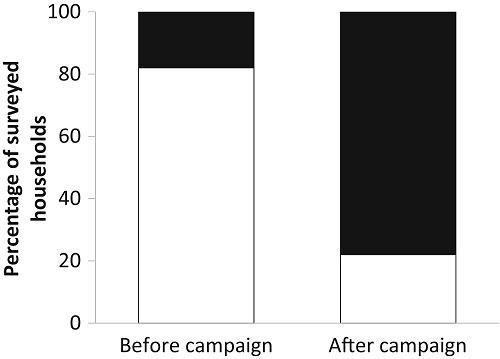当前位置:
X-MOL 学术
›
Am. J. Primatol.
›
论文详情
Our official English website, www.x-mol.net, welcomes your
feedback! (Note: you will need to create a separate account there.)
A case study of improved cook stoves in primate conservation from Democratic Republic of Congo
American Journal of Primatology ( IF 2.0 ) Pub Date : 2020-11-24 , DOI: 10.1002/ajp.23218 Sonya M Kahlenberg 1 , Tammie Bettinger 1 , Honoré K Masumbuko 1 , Gracianne K Basyanirya 1 , Simisi M Guy 1 , Jonathan K Katsongo 1 , Nadine Kocanjer 2 , Laurie Warfield 2 , Jackson K Mbeke 1
American Journal of Primatology ( IF 2.0 ) Pub Date : 2020-11-24 , DOI: 10.1002/ajp.23218 Sonya M Kahlenberg 1 , Tammie Bettinger 1 , Honoré K Masumbuko 1 , Gracianne K Basyanirya 1 , Simisi M Guy 1 , Jonathan K Katsongo 1 , Nadine Kocanjer 2 , Laurie Warfield 2 , Jackson K Mbeke 1
Affiliation

|
Human communities living near nonhuman primate habitats often depend on wood from forests for their energy needs. Improving the efficiency of local cook stoves is a potential “win‐win” solution that is commonly promoted to protect forests and improve human health and development. Despite the popularity of improved stove projects in primate conservation, few outcomes have been formally published. As a result, it is currently unclear whether this approach is a wise investment of limited conservation funds. This paper describes a pilot study conducted by the Gorilla Rehabilitation and Conservation Education Center to evaluate the potential for using improved stoves for the conservation of an important habitat for Grauer's gorillas and chimpanzees in eastern Democratic Republic of Congo. Community surveys and observations of human forest use revealed a heavy local reliance on forest‐derived wood. Wood was the main source of fuel used in households, the most highly valued forest resource, and the primary resource extracted during forest observations. It was primarily collected by women and children. The use of traditional, inefficient three‐stone hearths for cooking was also widespread. A 2‐year campaign using a community‐based social marketing approach resulted in an increase in improved stove installations from 18% to 78% of households in one village. After stove adoption, weekly household wood consumption was reduced by half. Campaign elements that showed promise include promotion using women's networks and intensive follow‐up assessment and support. We conclude that, if scaled up, improved stoves may be a useful strategy for reducing encroachment into our target protected area but that successful implementation will require a significant long‐term commitment with evaluation and oversight. It is recommended that before investing in improved stoves, primate conservation projects take long‐term and evaluation requirements into consideration.
中文翻译:

刚果民主共和国灵长类动物保护中改良炉灶的案例研究
居住在非人类灵长类动物栖息地附近的人类社区通常依赖森林中的木材来满足他们的能源需求。提高当地炉灶的效率是一种潜在的“双赢”解决方案,通常被推广用于保护森林和改善人类健康与发展。尽管改进炉灶项目在灵长类动物保护中很受欢迎,但很少有成果正式发表。因此,目前尚不清楚这种方法是否是对有限保护资金的明智投资。本文介绍了由大猩猩康复和保护教育中心进行的一项试点研究,旨在评估使用改良炉灶保护刚果民主共和国东部格劳尔大猩猩和黑猩猩重要栖息地的潜力。对人类森林利用的社区调查和观察表明,当地严重依赖森林衍生木材。木材是家庭使用的主要燃料来源,是最有价值的森林资源,也是森林观察期间提取的主要资源。它主要由妇女和儿童收集。使用传统的、效率低下的三石炉做饭也很普遍。使用基于社区的社会营销方法进行的为期 2 年的活动使一个村庄的家庭安装改良炉灶的比例从 18% 增加到 78%。采用炉灶后,每周家庭木材消耗量减少了一半。显示出希望的运动元素包括利用妇女网络进行宣传以及密集的后续评估和支持。我们得出的结论是,如果扩大规模,改进的炉灶可能是减少对我们目标保护区的侵占的有用策略,但成功实施将需要对评估和监督作出重大的长期承诺。建议在投资改良炉灶之前,灵长类动物保护项目应考虑长期和评估要求。
更新日期:2020-11-25
中文翻译:

刚果民主共和国灵长类动物保护中改良炉灶的案例研究
居住在非人类灵长类动物栖息地附近的人类社区通常依赖森林中的木材来满足他们的能源需求。提高当地炉灶的效率是一种潜在的“双赢”解决方案,通常被推广用于保护森林和改善人类健康与发展。尽管改进炉灶项目在灵长类动物保护中很受欢迎,但很少有成果正式发表。因此,目前尚不清楚这种方法是否是对有限保护资金的明智投资。本文介绍了由大猩猩康复和保护教育中心进行的一项试点研究,旨在评估使用改良炉灶保护刚果民主共和国东部格劳尔大猩猩和黑猩猩重要栖息地的潜力。对人类森林利用的社区调查和观察表明,当地严重依赖森林衍生木材。木材是家庭使用的主要燃料来源,是最有价值的森林资源,也是森林观察期间提取的主要资源。它主要由妇女和儿童收集。使用传统的、效率低下的三石炉做饭也很普遍。使用基于社区的社会营销方法进行的为期 2 年的活动使一个村庄的家庭安装改良炉灶的比例从 18% 增加到 78%。采用炉灶后,每周家庭木材消耗量减少了一半。显示出希望的运动元素包括利用妇女网络进行宣传以及密集的后续评估和支持。我们得出的结论是,如果扩大规模,改进的炉灶可能是减少对我们目标保护区的侵占的有用策略,但成功实施将需要对评估和监督作出重大的长期承诺。建议在投资改良炉灶之前,灵长类动物保护项目应考虑长期和评估要求。











































 京公网安备 11010802027423号
京公网安备 11010802027423号